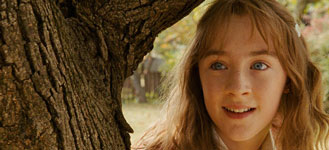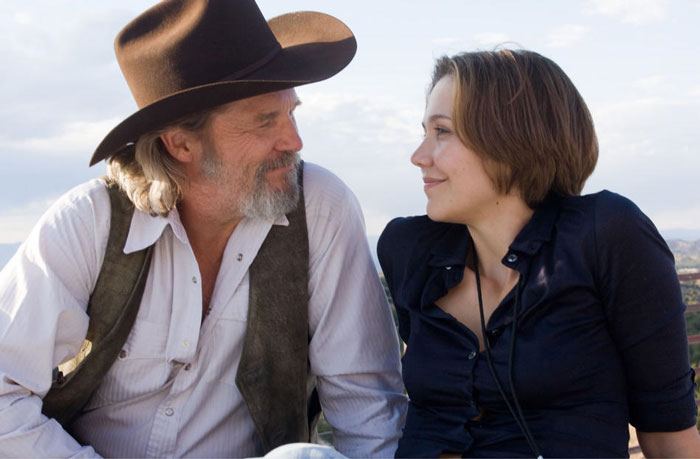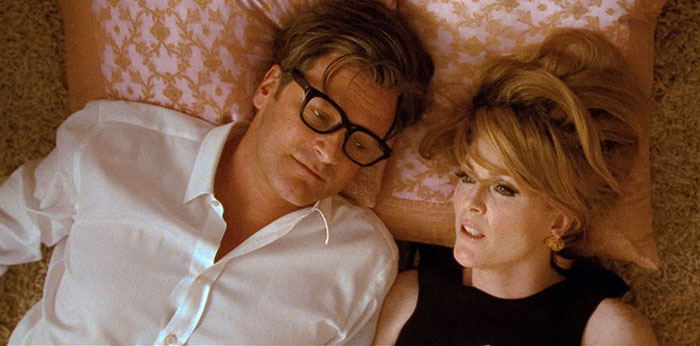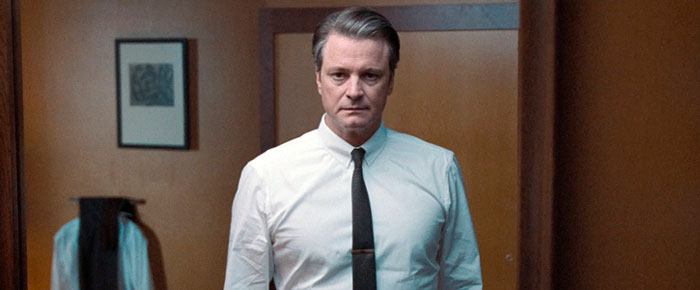The Lovely Bones (Paramount)
For a film that tackles such an emotionally weighty topic—namely, the rape and murder of an innocent girl—there is little genuine emotion to be found in The Lovely Bones. Director Peter Jackson, the master craftsman behind the Lord of the Rings trilogy (arguably the greatest filmmaking triumph of the aughts), fills every frame with visual splendor and an unmerited sense of gravitas, suffocating the story’s sensitive subject matter.
His interpretation of the “in-between,” the purgatorial world that victim and protagonist Susie Salmon inhabits through most of the film, is a frequently awe-inspiring amalgam of girlish fantasy, immortal bliss, and paranoid pipe-dream; though its immensity engulfs the accompanying tale of humanity and grief in the wake of inexplicable tragedy. Even the renderings of reality are delectably pungent, from rich lensing and lighting to vibrant character and set designs, but again, the intentions are much too calculated to register authentic pathos.
Beneath the barrage of sights and sounds (including a gorgeous, albeit intrusive score by Brian Eno) lie strong performances: a luminescent Saoirse Ronan (pronounced SEER-shuh, for the uninformed) as the eager-eyed Susie herself, the always formidable Rachel Weisz as Susie’s mother, and a meticulous and disturbing turn by Stanley Tucci as Susie’s assailant George Harvey.
But the cracks in the film’s foundation run much deeper. The narrative is unwieldy, flitting back and forth between fantasy and a tonally incongruous reality, while its purpose gets lost in the shuffle (the in-between-in-between, maybe?). The plot feels like one of convenience, and character developments, aside from superficial presumptions, are negligible.
Still, there is a clear sense that a strong effort and a great deal of thought were put forth by everyone involved, so even within its limited successes, the film is truly, very watchable. Peter Jackson and his crew pin-prick and fine-tune every nook and cranny of the story. In moments of high intensity or dramatic consequence, this style works quite well—as when Susie’s sister Lindsey finds herself effectively cornered without escape by the murderous Harvey in one harrowing scene, or, even moreso, as in nearly the entirety of the Lord of the Rings trilogy.
You can almost see Mr. Jackson channeling his Lord of the Rings stylistic approach here, too. Susie is dwarfed by the expansive and elaborate “in-between” world, much like Frodo and his hobbit friends crossing through the breathtaking and boundless Middle Earth. George Harvey stands like some impressive evil, twisting his face into a menacing glare, just as Sauron towered above armies of slain opponents, casting his shadow across his empire. Even Susie’s silvery trinkets are captured in close-up against a fiery flicker: “the one charm bracelet to rule them all.” At times, the effect is indeed self-parodying. This sort of epic, wondrous detachment simply cannot convincingly convey the more delicate side of the emotional spectrum or, for that matter, the intensely delicate story of The Lovely Bones.
Grade: C
Directed by Peter Jackson. Written by Fran Walsh, Philippa Boyens, & Peter Jackson, based on the novel by Alice Sebold.
Rated PG-13 for mature thematic material involving disturbing violent content and images, and some language.
Runtime is 2 hours, 15 minutes.
Tickets & Showtimes» Watch the Trailer» Visit the Website»
Crazy Heart (Fox Searchlight)
Simplicity lies at the heart of director Scott Cooper’s debut film about a crusty, rundown country musician working to relearn his legs in life. As a story of personal struggle and the precious potentials of humanity, the film works quite well, its rugged emotion registering comfortably. It’s also a familiar tale, however, and many of its events occur amid considerable foresight.
Jeff Bridges gives a strong and thoughtful performance as also-ran leading man “Bad” Blake, stumbling down the windy road of redemption. He adeptly portrays the bitter side of a bleak existence, maneuvering with great conviction through drunkenness, dishevelment, and searing solemnity.
But Bridges scores biggest not while hunched over the toilet bowl; it’s when he provides unrestricted access to his character’s big and beautiful heart. Whether strumming and singing a velvety tune or making biscuits with a little boy, Bad Blake carries a considerable warmth—owed entirely to Bridges’ commitment and authenticity.
Maggie Gyllenhaal steps in as Jean Craddock, a local reporter who is taken by Blake’s grizzled looks and bristly charms. Though her performance is noticeably more affected, Gyllenhaal gives Craddock the same honest, accessible emotion that Bridges offers up for Blake. The two make a surprisingly tender, convincing couple, even if Craddock falls for Blake a bit too readily and then readjusts her feelings with a similar, suspicious heedlessness.
The film’s conventional narrative is also anemic, with plot elements squeezed between moments of self-discovery to fill space more than tell a story. A disorienting “sixteen months later” text slide late in the game is especially off-putting, but the film redeems itself, and then some, on the virtue of its music.
Bridges’ voice reverberates with cozy, gravely tones, and original songs by T. Bone Burnett and the late Stephen Bruton are smooth and soulful. The film’s self-proclaimed theme “The Weary Kind,” written by Burnett with Ryan Bingham (who also performs the song beneath the end credits), weaves a rich and cinematic saga of its own. It’s the gravy on Crazy Heart’s mashed potatoes—a hearty, warm, and satisfying side dish indeed, but missing the meat and other trimmings that would make a full meal.
Grade: B
Written & Directed by Scott Cooper. Based on the novel by Thomas Cobb.
Rated R for language and brief sexuality.
Runtime is 1 hour, 51 minutes.
Showtimes @ The Charles» Watch the Trailer» Visit the Website»
A Single Man (Weinstein Co.)
From Gucci guru to film director, Tom Ford transports his artistic vision from the runway to the big screen with A Single Man. His instinct for the aesthetic is evident, and its effects are dazzling. Every frame pulsates with an exquisite, classic beauty that perfectly recalls the early 1960s—much like television’s Mad Men, only with a sharper attention to detail and whimsy.
As a series of images, it’s an utterly gorgeous exercise. When put into motion, Ford’s inexperience begins to show. His shot selection is often sloppy, and scenes are spliced together with amateur abruptness. His framing and plotting are obnoxiously deliberate, making for a predictable narrative course and, quite regrettably, dulling any legitimate filmmaking feats.
In a more seasoned set of hands, or, perhaps, with more professional guidance, A Single Man might have been a complete cinematic triumph. Instead, Ford tries to reinforce every emotion and statement of splendor with quick cuts, camera tricks, and clumsy use of a sweeping score, each time only smothering the intentions of the narrative and its performers.
In the case of Colin Firth, Ford’s distractions feel criminal. Firth plays George, a gay man and English professor struggling to move forward after the untimely death of his partner. He is, simply put, astounding: smoldering with inspiration—at times commanding, at times melancholy—in both his smallest glances and his grandest gestures. Firth brings George beyond the confines of the film, carefully crafting with his actions and reactions, both subtle and strong, a fully-realized human being with a lifetime—not a running time—of experiences.
What’s more, Firth maintains a blinding brilliance even as the rest of the film partakes in dimmer practices, such as the intrusive impatience of director Tom Ford or the shrill histrionics of supporting player Julianne Moore. George also does not stand on the grand sort of ground that tends to embolden the most memorable movie portrayals; last year, film titans Sean Penn and Mickey Rourke were propped up by soapboxes and wrestling rings for their lauded turns in Milk and The Wrestler, respectively. Colin Firth, by contrast, plays here a single, simple man, bearing no marks of singularity or import, while still accomplishing an astonishing emotional resonance.
In his portrait of George in Tom Ford’s A Single Man, Colin Firth gives one of the most perceptive and powerful performances in recent memory. I declare it thus in language as official as my capacities permit. The entire film is a radiant exploration of beauty, but the irony, and what Tom Ford does not seem to understand, is that A Single Man’s most beautiful component is its central surveyor: Colin Firth in a stunning, staggering portrayal.
Grade: B
Directed by Tom Ford. Written by Tom Ford & David Scearce, based on the novel by Christopher Isherwood.
Rated R for some disturbing images and nudity/sexual content.
Runtime is 1 hour, 39 minutes.
Showtimes @ The Charles» Watch the Trailer» Visit the Website»











Rachel Weisz have that mysterious look and she is very appealing to most men and women “`”